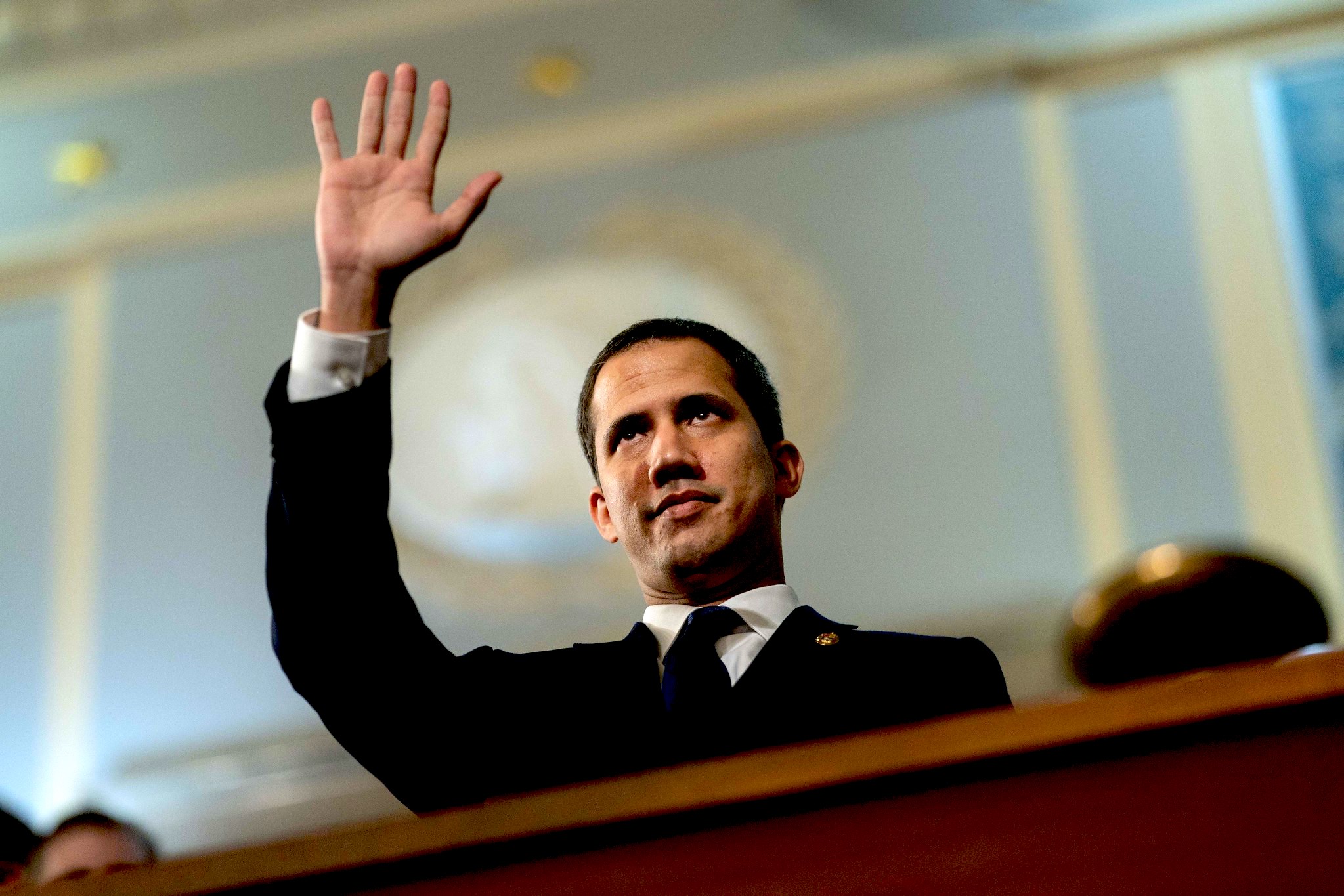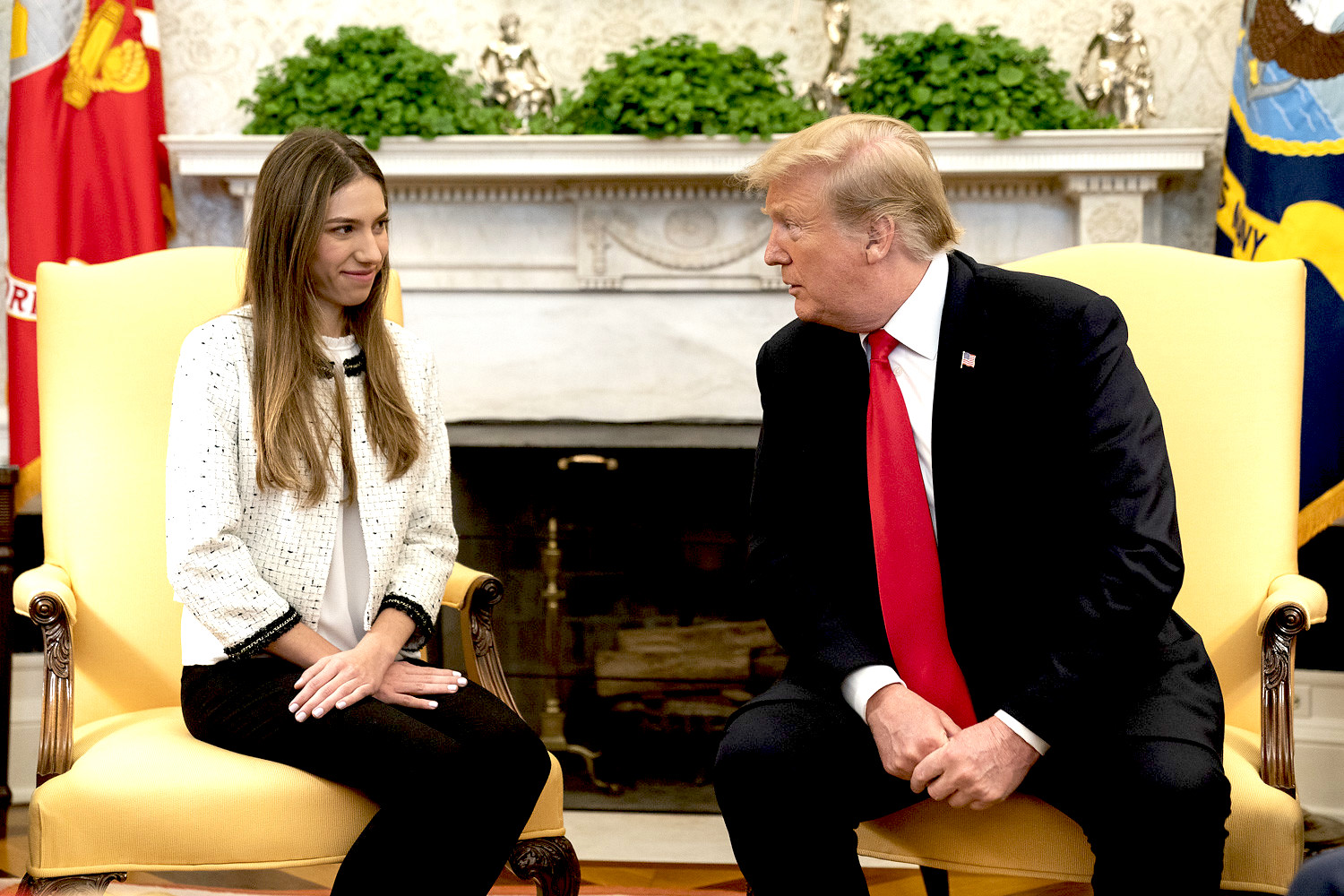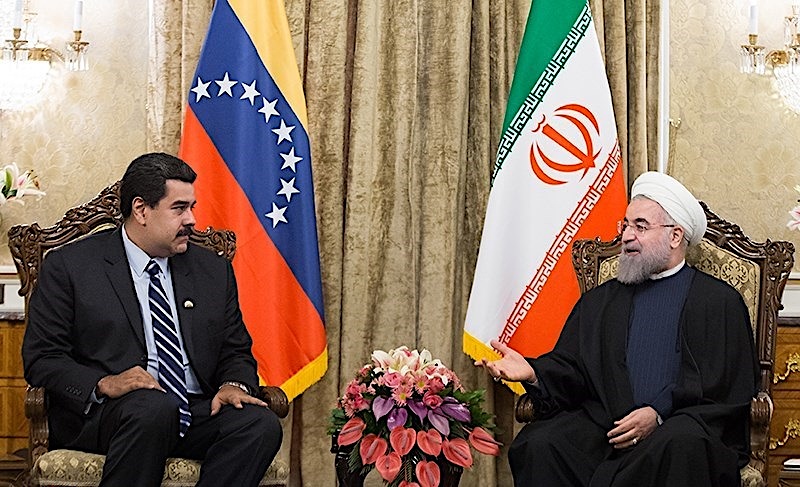With Trump’s cabinet full of hawks, Alan MacLeod assesses the potential for the president-elect’s second administration to cause more trouble for the Maduro government.

Venezuelan President Nicolás Maduro holding the two United States passports of captured former Green Beret operatives during U.S. Operation Gideon in 2020. (Prensa Presidencial, Government of Venezuela, Wikimedia Commons, CC BY 3.0)
By Alan MacLeod
MintPress News
 The re-election of Donald Trump to the presidency of the United States has many people in Venezuela extremely concerned.
The re-election of Donald Trump to the presidency of the United States has many people in Venezuela extremely concerned.
From assassinations, terror campaigns, sanctions and coups, the first Trump administration tried everything short of a full-scale invasion of the country. With a cabinet full of hawks, MintPress assesses the potential for a future U.S. intervention in Venezuela.
Invasion 2.0?
According to insiders such as former Defense Secretary Mark Esper and National Security Advisor John Bolton, Trump was one of the loudest voices in the White House pushing for military intervention in the Caribbean nation. The president said that it would be “cool” to invade, as the country was “really part of the United States.”
“[The possibility of] military action can’t be discarded,” Steve Ellner, a retired professor who taught political science at the Universidad de Oriente in Venezuela for 40 years, told MintPress, adding:
“Biden’s foreign policy in general and his policy toward Venezuela in particular were terrible. But I believe Trump’s policy toward Venezuela is going to be even worse. Trump’s choice of no one other than Marco Rubio as secretary of state should dispel any illusion about Trump being better on foreign policy toward Venezuela than Biden.”
Rubio, a Cuban-American conservative, has, for decades, been one of the leaders of the regime change lobby in Washington. In 2019, during a U.S.-backed coup attempt, he went so far as to tweet images of the capture, death and bloody assassination of Libyan leader Muammar Gaddafi at President Nicolás Maduro.
A second figure advising Trump is mercenary leader Erik Prince. In September, Prince released a video supporting armed anti-government Venezuelan forces and not-so-subtly hinting that American forces would be in the country in the near future. “Your friends from the North, though we are not with you today, although we are coming soon. We will support you to the end,” he said.
Please Support CN’s
Winter Fund Drive!![]()
When asked by MintPress about Prince’s comments, Venezuelan government minister William Castillo Bollé brushed them off. “Erik Prince is a clown,” he said, noting that his words were part of a “psychological intimidation operation” against the country.
President Maduro, for his part, has taken a conciliatory approach, congratulating Trump on his victory and claiming that it could mean a “new start” in the U.S.-Venezuela relationship.
Yet, towards the end of his previous term, Trump oversaw an attempted invasion of the Latin American state. An assault team led by Green Berets landed in Venezuela with the intention of shooting their way to the presidential palace and installing U.S.-backed politician Juan Guaidó as dictator.
The plan was extremely detailed, well-funded, and was directed and green-lit by White House officials. Washington even worked with Spanish bank Banco Santander to distribute preloaded debit cards across the country en masse, in effect, buying off the population. However, the operation was executed with Jan. 6 levels of incompetence.
The Venezuelan military failed to rebel, and the heavily armed mercenaries were overpowered by lobstermen from the House of Socialist Fishermen collective, equipped with little more than old revolvers and fishing knives. What was code-named “Operation Gideon” by its planners came to be known worldwide as Trump’s “Bay of Piglets” disaster.
According to Colombian President Gustavo Petro, Donald Trump also sought permission from his country to invade Venezuela from there.
Our Man in Caracas

Guaidó on Feb. 4, 2020, after Trump recognized him as the legitimate leader of Venezuela during the State of the Union address at the U.S. Capitol in Washington, D.C. (White House, D. Myles Cullen)
Another hare-brained scheme the Trump administration launched was the construction and recognition of a parallel government in Venezuela led by Guaidó, a previously largely unknown character, even inside Venezuela.
Intelligence agencies in Washington had been grooming Guaidó since his days as a student leader, flying him around the world for training and meetings with top Western officials. To the surprise of almost everybody in Venezuela, Guaidó proclaimed himself the rightful president of the country despite never even standing for the position.
And while the United States and a number of right-wing Latin American nations quickly recognized him, he was never able to build a popular support base inside the country. Indeed, Guaidó was so unpopular that he could not go out in public without being accosted or harassed by ordinary citizens.
[See: Washington’s Version of Venezuela]
In Washington, however, he was met with a hero’s welcome, receiving a standing ovation as Trump’s guest of honor at his State of the Union speech. In public, Trump described him as a freedom fighter and “the true and legitimate president” of Venezuela.
Behind closed doors, however, the 45th president considered Guaidó a weak and incompetent politician and took to calling him “the Beto O’Rourke of Venezuela.” In contrast, he saw Maduro as a strong leader who had the backing of the military, and while Guaidó visited the Oval Office to plead with Trump to launch an invasion, Trump ignored him and seemed more interested in flirting with Guaidó’s wife.

Fabiana Rosales de Guaido with Trump at the White House on March 27, 2019. (White House, Shealah Craighead)
Assassinations & Terrorism
In August 2018, while giving a public speech in Caracas, Maduro narrowly survived a drone assassination attempt. Bolton’s memoir, The Room Where It Happened, implies that the United States was involved in the incident.
But this was far from the only act of international terrorism the U.S. helped plan. White House officials agreed to what they called the development of
“kinetic and nonkinetic options, both overt and [REDACTED], that could disrupt Venezuela’s oil and arms shipments. Options would need to include actions that would have a material impact on key industrial and other high-value targets.”
Just weeks after that decision, Venezuelan authorities arrested ex-C.I.A. agent Matthew Heath outside the country’s largest oil refining complex. When apprehended, Heath was carrying a submachine gun, a grenade launcher, four blocks of C4 explosives, a satellite phone, stacks of U.S. dollars and detailed information about the building.
The U.S. also worked with Colombian paramilitaries to carry out attacks inside Venezuela. This sheds new light on a number of highly suspicious explosions, fires, blackouts and other disasters occurring inside Venezuela — events that the Maduro government blamed on the U.S.
Sanctions, Piracy & Kidnapping
The most far-reaching U.S. action against Venezuela, however, has been the punishing sanctions regime. The economic blockade of the country – which includes intimidating foreign nations and businesses into ceasing trading with Venezuela – devastated the country, leading to huge shortages of goods. Although some sanctions have been in place since 2004, they were drastically expanded under the Trump administration.
Alfred de Zayas, an (American) United Nations special rapporteur who visited the country in 2018, likened the blockade to a “Medieval Siege” and estimated that, in the space of just a few years, more than 100,000 Venezuelans had been killed as a result. De Zayas labeled it a crime against humanity.
In addition to the sanctions, the U.S. launched huge financial and cyberattacks against the country’s infrastructure. In this, it found a willing partner in the Bank of England, which froze over $1.2 billion in gold belonging to Venezuela.
As a result, the Venezuelan economy nosedived, inflation ran rampant, and without the ability to purchase spare parts to maintain their machines, the country’s oil industry sputtered to a halt. And when Iranian oil tankers arrived in the Caribbean to supply Caracas with much-needed fuel, the U.S. Navy seized them, in an extraordinary case of international piracy.

Maduro meeting with Iranian President Hassan Rouhani in 2015. (Tasnim News Agency, Wikimedia Commons, CC BY 4.0)
Iran proved to be a key ally in breaking the U.S. stranglehold and reviving the nation’s economy. Angered by this, Washington attempted to put a stop to Iran-Venezuela cooperation. In 2020, it kidnapped Venezuelan businessman Alex Saab while he was returning from Tehran on diplomatic business, holding him hostage for three years until a prisoner exchange was agreed upon.
Sanctions and economic war are designed, according to the State Department, to “decrease monetary and real wages, to bring about hunger, desperation and overthrow of government.”
Yet Venezuela has shown significant signs of recovery. Inflation has dropped to manageable levels, and oil and food production are increasing. Furthermore, the blockade itself has united the country against a foreign threat. One survey found that 82% of the public reject the sanctions.
Venezuela Libre
Seeing the failure of sanctions to achieve their goal, could the United States be tempted into an Iraq-style military invasion? With people like Erik Prince, Marco Rubio and Elon Musk (who openly called for Maduro’s overthrow) in Trump’s ear, it is far from impossible.
However, a number of factors would seriously complicate this course of action. For one, Trump is promising to carry out the “largest deportation operation in American history.” A significant portion of those immigrants he is targeting come from Venezuela, and Washington would likely need some level of cooperation from Caracas to do so, meaning better relations may be helpful.
Secondly, as Ellner explained, the balance of political forces across Latin America and the world has changed. No longer is the region dominated by reactionary governments, and Venezuela is far less isolated than it was previously. It has even found friends further afield in the BRICS economic bloc.
The correlation of forces in Latin America is much more favorable, and BRICS represents an alternative bloc for Venezuela. For this reason, Brazil’s veto of Venezuela’s membership in BRICS was a blow, but not a definitive one since Venezuela continues to maintain organizational ties with it and solid economic ties with its member nations, even India.”
Finally, in the face of increased threats from the north, the Venezuelan people have not remained passive. Around 4 million individuals are now enlisted in armed civilian militias.
Added to the already competent Venezuelan Armed Forces, these groups are dedicated to defending the country and its social progress, such as free healthcare, public education and widespread extremely low-cost social housing.
Thus, while Trump could still have his eyes on Venezuela, he might be well advised not to enter into a conflict that could make Iraq or Afghanistan look like a cakewalk.
Alan MacLeod is senior staff writer for MintPress News. After completing his PhD in 2017 he published two books: Bad News From Venezuela: Twenty Years of Fake News and Misreporting and Propaganda in the Information Age: Still Manufacturing Consent, as well as a number of academic articles. He has also contributed to FAIR.org, The Guardian,
Salon, The Grayzone, Jacobin Magazine and Common Dreams.
This article is from MPN.news, an award winning investigative newsroom. Sign up for their newsletter.
Views expressed in this article may or may not reflect those of Consortium News.
Please Support CN’s
Winter Fund Drive!![]()
Make a tax-deductible donation securely by credit card or check by clicking the red button:


“the United States and a number of right-wing Latin American nations quickly recognized [Guaido]”
— another right-wing country in the Americas that did the same was Canada,
which carried on a legal, diplomatic, political and economic crusade against Venezuela,
led by foreign minister Chrystia Freeland, now deputy prime minister.
The governor of the Bank of England who denied Venezuela’s right to use the gold
stored in London to buy food and medicine during the pandemic was Mark Carney,
a Canadian now tipped to succeed Justin Trudeau as Liberal Party leader.
Probably. His failure to change the Venezuela regime was one of his bigger failures.
A promise of huge “donations” to the DemReps would probably open up the oil market for Venezuela.
Give them ten percent of expected oil profits of US companies per barrel and watch the policy change.
The USG runs on bribes to parties, and the bribery percentage of profits from corruption is not very high.
Of course the antisocialists must also be appeased, so some whitewashing is needed there as well.
Perhaps declare a blend of regulated market economy with socialism under a new brand name:
“Blended economy” or “experimental economics” or “market socialism” or “competitive socialism.”
It used top be called a mixed economy.
I hope Trump’s flirtation with regime change in Venezuela during his 1st term was due to him ‘listening to the experts’ in the intelligence community. That shouldn’t be a problem this time, as he seems to regard all of them as a den of vipers and holds them in very low esteem.
I suspect he is of two minds when it comes to Venezuela.
On the one hand, he doesn’t see it as a genuine national security threat that requires intervention. Indeed, it might behoove him to stabilize the Maduro regime in order to (1) cut down the flow of Venezuelan migrants that illegally cross the border and (2) get Venezuela to take back their citizens who already illegally emigrated into the USA and are set to be deported.
On the other hand, he’s a capitalist’s capitalist, and doesn’t like socialist/communist regimes. Nor does he like to see massive underutilized assets (like Venezuela’s oil reserves) outside of American control or at the very least not giving a substantial skim to Uncle Sam. I could see a scenario where Trump tries to export his ‘drill, baby, drill’ policy south of the border by taking another swing at installing a puppet regime in Venezuela and getting his tiny hands on that black gold.
Hopefully, he opts for the former rather than the latter, but one can never tell with the mercurial Mango Mussolini.
Trump said it would be “cool” to invade, as the country was “really part of the United States.” Trump would make a huge mistake if he were to invade Venezuela. Just because Venezuela is rich in oil does not make it “part of the US”
Venezuela is part of Latin America in location, culture, language and every other way, and other Latino nations would no doubt come to its defense.
Good points covered here.
I wouldn’t worry about any direct invasion by US military. We can expect more meddling, more funding violent uprisings, more illegal economic siege warfare (or in NewSpeak: “sanctions”), more attempted coups, more propaganda to demonize Venezuela’s govt. and people. (And still no return of Venezuela’s seized gold reserves by the BoE pirates)
We can expect more of the starvation siege of Cuba as well, and the situation in Cuba appears even worse than in Venezuela.
It is HIGH TIME that someone, anyone, anything teach the US a lesson it won’t forget so soon. Terrorizing the world…America’s style of ‘democracy and human rights’.
Meh
I despise interventionist American foreign policy as much as the next guy, but nature abhors a vacuum. If they don’t fill the interventionist busybody role, some other nation will, most likely China. Or no one will and we’ll be back to the chaos of the early 20th century where a half-dozen aspiring hegemons are constantly butting heads and starting world wars. The post-WWII American-dominated world order has a metric ton of flaws, but it beats the heck out of the pre-WWII alternative.